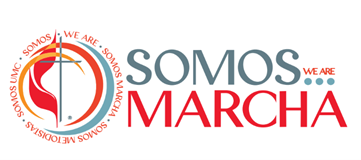Chinese Caucus requests lifting of Carcaño’s suspension
OPEN LETTER TO THE COUNCIL OF BISHOPS OF THE UNITED METHODIST CHURCH April 29, 2023 Dear Council of Bishops, Greetings in the name of our risen Lord Jesus Christ. Today is t
Open Letter to the Council of Bishops
Open Letter to the Council of Bishops Of the United Methodist Church April 28, 2023 Dear Council of Bishops, We greet you in the name of our Resurrected Lord, Jesus the Christ!
MARCHA 2023 – San Antonio, TX
It's time to gather for MARCHA 2023!
PRESS RELEASE: MARCHA RESPONDS TO WESTERN JURISDICTION STATEMENT
MARCHA condemns the intrusion into fair process and the breach of confidentiality by unidentified parties who, in the name of “The Western Jurisdiction” have delivered misleadi
MARCHA Affirms Candidates for Bishop in The United Methodist Church
At the 2019 Annual Meeting of MARCHA, celebrated in the city of Philadelphia, the Assembly of MARCHA affirmed the nomination of candidates for the office of bishop in The United
IESDG Supports Endorsement of Rev. Dr. David Wilson as Episcopal Candidate
The United Methodist Church The Inter-Ethnic Strategy Development Group (IESDG) represents the racial-ethnic caucuses of the United Methodist Church. The IESDG supports the Native
MARCHA Responds to the Judicial Council Memorandum Number 1450
MARCHA (Methodists Associated Representing the Cause of Hispanic/Latinx American) is outraged, and frankly speechless, at the injustices in the complaint process related to Bishop
MARCHA and JFON Respond to the Busing of Asylum Seekers
Vea abajo para versión en español National Justice For Our Neighbors, a network of 19 immigration legal service providers, and Methodists Associated Representing the Cause of Hi
Open Letter to the Council of Bishops of the United Methodist Church
Dear Bishops, we greet you in the name of Christ and on behalf of MARCHA (Methodists Associated Representing the Cause of Hispanic/Latinx Americans). We write to you with a trouble
When Apologies Fail Us – A Call to Repentance (Reflections on recent events at the Arkansas Annual Conference Session)
Reflections on recent events at the Arkansas Annual Conference Session “Tension” is not an adjective fit enough to describe the days we are living. We are walking on
